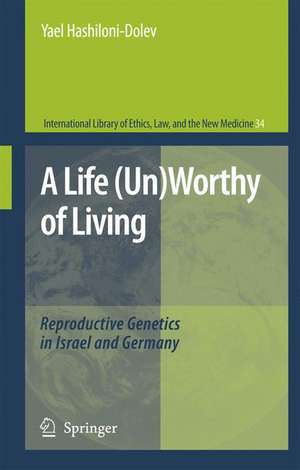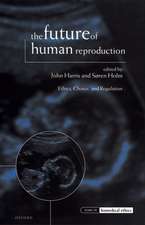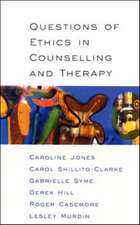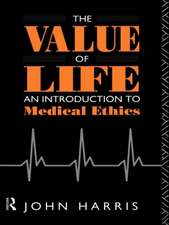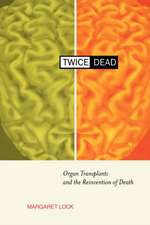A Life (Un)Worthy of Living: Reproductive Genetics in Israel and Germany: International Library of Ethics, Law, and the New Medicine, cartea 34
Autor Yael Hashiloni-Doleven Limba Engleză Hardback – 30 mar 2007
A close comparative analysis of the ways that these two societies handle the delicate balance between the quality and sanctity of life illuminates the controversy around reproductive genetics in an original and provocative way. The study is also innovative in its use of contemporary social theory concerning the politics of life in comprehending the differences between two societies positioned at opposite extremes in their adoption of reproductive genetics. It thus offers an original cross-cultural discussion concerning present-day techno-medical manipulations of life itself.
| Toate formatele și edițiile | Preț | Express |
|---|---|---|
| Paperback (1) | 1090.04 lei 6-8 săpt. | |
| SPRINGER NETHERLANDS – 20 noi 2010 | 1090.04 lei 6-8 săpt. | |
| Hardback (1) | 1096.98 lei 6-8 săpt. | |
| SPRINGER NETHERLANDS – 30 mar 2007 | 1096.98 lei 6-8 săpt. |
Din seria International Library of Ethics, Law, and the New Medicine
- 5%
 Preț: 347.30 lei
Preț: 347.30 lei -
 Preț: 397.26 lei
Preț: 397.26 lei - 15%
 Preț: 635.31 lei
Preț: 635.31 lei - 18%
 Preț: 942.76 lei
Preț: 942.76 lei - 5%
 Preț: 718.65 lei
Preț: 718.65 lei - 15%
 Preț: 634.68 lei
Preț: 634.68 lei - 15%
 Preț: 637.78 lei
Preț: 637.78 lei -
 Preț: 380.07 lei
Preț: 380.07 lei - 18%
 Preț: 959.98 lei
Preț: 959.98 lei - 15%
 Preț: 641.20 lei
Preț: 641.20 lei - 18%
 Preț: 944.19 lei
Preț: 944.19 lei - 15%
 Preț: 636.80 lei
Preț: 636.80 lei - 15%
 Preț: 643.00 lei
Preț: 643.00 lei - 18%
 Preț: 952.89 lei
Preț: 952.89 lei - 15%
 Preț: 643.48 lei
Preț: 643.48 lei - 18%
 Preț: 954.45 lei
Preț: 954.45 lei - 5%
 Preț: 1095.73 lei
Preț: 1095.73 lei - 15%
 Preț: 645.79 lei
Preț: 645.79 lei - 18%
 Preț: 1111.22 lei
Preț: 1111.22 lei - 15%
 Preț: 643.84 lei
Preț: 643.84 lei - 18%
 Preț: 1227.67 lei
Preț: 1227.67 lei - 18%
 Preț: 953.65 lei
Preț: 953.65 lei - 15%
 Preț: 638.57 lei
Preț: 638.57 lei - 5%
 Preț: 1101.21 lei
Preț: 1101.21 lei
Preț: 1096.98 lei
Preț vechi: 1154.72 lei
-5% Nou
Puncte Express: 1645
Preț estimativ în valută:
209.90€ • 219.95$ • 173.53£
209.90€ • 219.95$ • 173.53£
Carte tipărită la comandă
Livrare economică 12-26 aprilie
Preluare comenzi: 021 569.72.76
Specificații
ISBN-13: 9781402052170
ISBN-10: 1402052170
Pagini: 220
Ilustrații: XX, 198 p.
Dimensiuni: 155 x 235 x 17 mm
Greutate: 0.49 kg
Ediția:2007
Editura: SPRINGER NETHERLANDS
Colecția Springer
Seria International Library of Ethics, Law, and the New Medicine
Locul publicării:Dordrecht, Netherlands
ISBN-10: 1402052170
Pagini: 220
Ilustrații: XX, 198 p.
Dimensiuni: 155 x 235 x 17 mm
Greutate: 0.49 kg
Ediția:2007
Editura: SPRINGER NETHERLANDS
Colecția Springer
Seria International Library of Ethics, Law, and the New Medicine
Locul publicării:Dordrecht, Netherlands
Public țintă
ResearchCuprins
Theoretical Background.- Methodology.- Getting to Know the Field of Reproductive Genetics in Israel and Germany.- Genetic Counselors’ Moral Practices.- Abortions on Embryopathic Grounds: Policy and Practice in Israel and Germany.- Sex Chromosome Anomalies (SCAs) in Israel and Germany: Assessing “Birth Defects” and edical Risks According to the Importance of Fertility*.- “Wrongful Life”, in the eyes of the law, the counselors and the disabled.- The Conflicts Between Individuals, Families and Society, as Well as Between Different Family Members, Embodied in Reproductive Genetics.
Recenzii
From the reviews:
"This is a unique and courageous book. Yael Hashiloni-Dolev studied the field of reproductive genetics in Israel and Germany, and found out that while in Germany social, cultural, legal and religious conditions restrict the selection of embryos based on prenatal diagnosis, it is strongly encouraged in Israel. This unexpected finding is brilliantly analyzed by the author. Thus this excellent book must be read and discussed by social scientists, human geneticists, genetic counsellors, bio ethicists and medical students." (Benno Müller – Hill, Dr. rer. nat. em. Prof. at the Institute of Genetics of the University of Cologne, Germany)
"An important contribution of the book is the examination of the cultural, national, institutional and personal background and attitudes of genetic counsellors. … This is a very interesting and useful book exemplifying how two modern societies can employ scientific, legal, and ethical reasoning differently. … Overall, the book is written in an eloquent and easy-to-read way, and its contribution to the literature on the sociology of health and the study of cultural bioethics is more than evident." (Daniel Sperling, Medicine, Healthcare and Philosophy, Vol. 12, 2009)
"This is a unique and courageous book. Yael Hashiloni-Dolev studied the field of reproductive genetics in Israel and Germany, and found out that while in Germany social, cultural, legal and religious conditions restrict the selection of embryos based on prenatal diagnosis, it is strongly encouraged in Israel. This unexpected finding is brilliantly analyzed by the author. Thus this excellent book must be read and discussed by social scientists, human geneticists, genetic counsellors, bio ethicists and medical students." (Benno Müller – Hill, Dr. rer. nat. em. Prof. at the Institute of Genetics of the University of Cologne, Germany)
"An important contribution of the book is the examination of the cultural, national, institutional and personal background and attitudes of genetic counsellors. … This is a very interesting and useful book exemplifying how two modern societies can employ scientific, legal, and ethical reasoning differently. … Overall, the book is written in an eloquent and easy-to-read way, and its contribution to the literature on the sociology of health and the study of cultural bioethics is more than evident." (Daniel Sperling, Medicine, Healthcare and Philosophy, Vol. 12, 2009)
Textul de pe ultima copertă
This book presents the findings of a study into the social shaping of reproductive genetics in Germany and Israel, two exceptionally interesting social settings, which share a traumatic history.
Based on a variety of empirical materials (including in-depth interviews with genetic counsellors and survey data on their practices and opinions, as well as analysis of legal, religious, professional and media texts), the study reveals dramatic differences between the way that the German and Israeli societies address the question of a life (un)worthy of living: while in Germany, social, cultural, religious and legal conditions restrict the selection of embryos based on prenatal diagnosis, in Israel they strongly encourage it.
A close comparative analysis of the ways that these two societies handle the delicate balance between the quality and sanctity of life illuminates the controversy around reproductive genetics in an original and provocative way. The study is also innovative in its use of contemporary social theory concerning the politics of life in comprehending the differences between two societies positioned at opposite extremes in their adoption of reproductive genetics. It thus offers an original cross-cultural discussion concerning present-day techno-medical manipulations of life itself.
‘This is a unique and courageous book. Yael Hashiloni-Dolev studied the field of reproductive genetics in Israel and Germany, and found out that while in Germany social, cultural, legal and religious conditions restrict the selection of embryos based on prenatal diagnosis, it is strongly encouraged in Israel. This unexpected finding is brilliantly analyzed by the author. Thus this excellent book must be read and discussed by social scientists, human geneticists, genetic counsellors, bio ethicists and medical students.'
Benno Müller – Hill, Dr. rer. nat. em. Prof. at theInstitute of Genetics of the University of Cologne, Cologne, Germany.
Based on a variety of empirical materials (including in-depth interviews with genetic counsellors and survey data on their practices and opinions, as well as analysis of legal, religious, professional and media texts), the study reveals dramatic differences between the way that the German and Israeli societies address the question of a life (un)worthy of living: while in Germany, social, cultural, religious and legal conditions restrict the selection of embryos based on prenatal diagnosis, in Israel they strongly encourage it.
A close comparative analysis of the ways that these two societies handle the delicate balance between the quality and sanctity of life illuminates the controversy around reproductive genetics in an original and provocative way. The study is also innovative in its use of contemporary social theory concerning the politics of life in comprehending the differences between two societies positioned at opposite extremes in their adoption of reproductive genetics. It thus offers an original cross-cultural discussion concerning present-day techno-medical manipulations of life itself.
‘This is a unique and courageous book. Yael Hashiloni-Dolev studied the field of reproductive genetics in Israel and Germany, and found out that while in Germany social, cultural, legal and religious conditions restrict the selection of embryos based on prenatal diagnosis, it is strongly encouraged in Israel. This unexpected finding is brilliantly analyzed by the author. Thus this excellent book must be read and discussed by social scientists, human geneticists, genetic counsellors, bio ethicists and medical students.'
Benno Müller – Hill, Dr. rer. nat. em. Prof. at theInstitute of Genetics of the University of Cologne, Cologne, Germany.
Caracteristici
Deals with cutting edge questions regarding human reproduction, genethics and the social application of new reproductive technologies Develops new concepts for discussing present day genetic manipulations of life itself, and contributes to both academic and political discussions concerning the biopolitics of the beginning of life Contributes to the social study of science and technology by arguing that different societies' adoption of repro-genetic technologies depends on local understandings of the concept of “life” Feeds the ongoing debate about the balance between the value versus the quality of life
